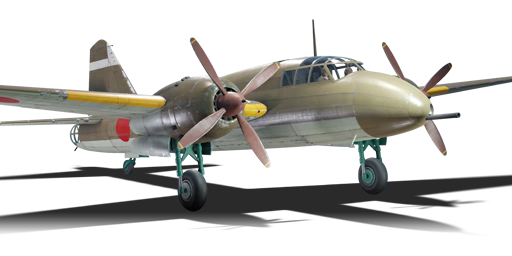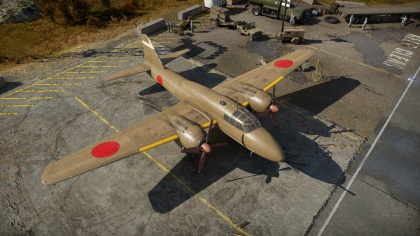Ki-109
Contents
Description
The Ki-109 is a rank Japanese twin-engine fighter
with a battle rating of (AB), (RB), and (SB). It was introduced in Update 1.71 "New E.R.A.".
Based on the Mitsubishi Ki-67 'heavy' bomber, the Ki-109 was designed as an interceptor in an attempt to counter the American bombing raids that devastated Japan. It is armed with a 75 mm anti-aircraft gun modified for aircraft use, and almost all defensive armament from the bomber version has been stripped, except for the tail turret, in order to maximise performance.
In-game, the Ki-109 functions much as it was intended to in reality. The 75 mm gun is effective against bombers, but struggles to hit small agile targets such as fighters. Its own defensive armament is very poor, and it should avoid combat with fighters at all costs. Alternatively, the 75 mm gun is also effective against tanks if a clean hit can be obtained.
General info
Flight performance
| Characteristics | Max Speed (km/h at 6,050 m) |
Max altitude (metres) |
Turn time (seconds) |
Rate of climb (metres/second) |
Take-off run (metres) | |||
|---|---|---|---|---|---|---|---|---|
| AB | RB | AB | RB | AB | RB | |||
| Stock | 531 | 515 | 21.0 | 21.8 | 8.3 | 8.3 | 650 | |
| Upgraded | 570 | 550 | 19.1 | 20.0 | 14.0 | 10.9 | ||
Details
| Features | ||||
|---|---|---|---|---|
| Combat flaps | Take-off flaps | Landing flaps | Air brakes | Arrestor gear |
| ✓ | ✓ | ✓ | X | X |
| Limits | ||||||
|---|---|---|---|---|---|---|
| Wings (km/h) | Gear (km/h) | Flaps (km/h) | Max Static G | |||
| Combat | Take-off | Landing | + | - | ||
| 450 | 450 | 250 | ~5 | ~1 | ||
| Optimal velocities (km/h) | |||
|---|---|---|---|
| Ailerons | Rudder | Elevators | Radiator |
| < 360 | < 360 | < 360 | > 313 |
Survivability and armour
Examine the survivability of the aircraft. Note how vulnerable the structure is and how secure the pilot is, whether the fuel tanks are armoured, etc. Describe the armour, if there is any, and also mention the vulnerability of other critical aircraft systems.
Armaments
Offensive armament
The Ki-109 is armed with:
- 1 x 75 mm Type 88 cannon, nose-mounted (15 rpg)
Defensive armament
The Ki-109 is defended by:
- 1 x 12.7 mm Ho-104 machine gun, dorsal turret (500 rpg)
Usage in battles
Ki-109 isn't only about the gun to attack ground targets, its also about intercepting enemies and returning safe and sound. While designed as an interceptor, the climbing rate is inadequate for this role when in stock condition; sideclimbing is a mandatory rule one should obey to. Despite its size, which resembles as medium bomber, Ki-109 is surprisingly manoeuvrable among all – if not, all nation – Japanese twin-engined heavy fighter, on par with Germany's Fw 190 series. Still, it's better not to use those blessings for dog-fighting a fighter: use the Ki-109's manoeuvrability to evade the bomber's defensive gunner if the first pass of a bomber interception fails. Another way to use the manoeuvrability is to outmaneuver inexperienced pilots in a heavy bomber who tries to evade the first shot by making a turn like a single-engine fighter for another pass. Or at a lower altitude, the Ki-109 can regain its position quickly for another pass on enemy tanks below.
The fuselage durability proved strong to shrug off machine gun calibre and some cannon. To add to the plane's defensive value, there is a rear machine gunner which could protect the plane's six o' clock. While so, its defensive armament can be underperforming, and it's more likely to lose the defensive gunner before an enemy plane is damaged as there are no protective glass protecting the gunner. In fact, the Ki-109 doesn't have any armour except at the bottom of the gun itself, which is quite meaningless for the overall plane. Due to this, head-on attacks is strongly unadvised and use the plane's manoeuvrability to evade incoming enemies in front of the plane. The plane is equipped with self-sealing tanks like in every Japanese heavy fighters, meaning the Ki-109 can withstand to accomplish its task(though, it is advised to retreat to base) while one of the wings are burning without breaking it.
Boasting a 75 mm Type 88, the gun itself quite versatile to take down both air and ground targets. This, however not without the drawbacks: 15 rounds of ammo stocked in the guns combined with very low rate of fire and somewhat low bullet velocity means ever shot should count because there are no secondary weapons equipped in the Ki-109. It is advised to seek an assistance with teammates to hunt down bombers. The recoil of the gun itself is another issue to settle off, so in order to minimise inaccurate shot, try to shoot the target during shallow dive. One thing to note, unlike any armour-piercing ammo where it contains not more than 90 gram, the ammo used in Type 88 filled with 460 gram of TNT, which proved overkill to take down even the biggest heavy bomber like Pe-8. Therefore, it is advisable to use AP-T ammo in every battle due its filling, while the HEFI-T has more 30 grams of TNT.
Manual Engine Control
| MEC elements | ||||||
|---|---|---|---|---|---|---|
| Mixer | Pitch | Radiator | Supercharger | Turbocharger | ||
| Oil | Water | Type | ||||
| Controllable | Controllable Not auto controlled |
Not controllable Not auto controlled |
Controllable Not auto controlled |
Combined | Controllable 2 gears |
Not controllable |
Modules
| Tier | Flight performance | Survivability | Weaponry | |
|---|---|---|---|---|
| I | Fuselage repair | Radiator | Turret 12 mm | |
| II | Compressor | Airframe | New 12 mm MGs (turret) | |
| III | Wings repair | Engine | Offensive 75 mm | |
| IV | Engine injection | Cover | New 75 mm cannons | |
Pros and cons
Pros:
- Powerful 75 mm gun, effective against bombers and tanks
- Relatively good performance and agility for its size
- Self-sealing fuel tanks
Cons:
- No forward-firing armament besides 75 mm gun
- Very low rate-of-fire for the 75 mm gun
- Extremely weak defensive armament
- No armour besides the 75 mm gun cradle
History
Describe the history of the creation and combat usage of the aircraft in more detail than in the introduction. If the historical reference turns out to be too long, take it to a separate article, taking a link to the article about the vehicle and adding a block "/History" (example: https://wiki.warthunder.com/(Vehicle-name)/History) and add a link to it here using the main template. Be sure to reference text and sources by using <ref></ref>, as well as adding them at the end of the article with <references />. This section may also include the vehicle's dev blog entry (if applicable) and the in-game encyclopedia description (under === In-game description ===, also if applicable).
Media
Excellent additions to the article would be video guides, screenshots from the game, and photos.
See also
Links to the articles on the War Thunder Wiki that you think will be useful for the reader, for example:
- reference to the series of the aircraft;
- links to approximate analogues of other nations and research trees.
External links
| Mitsubishi Company (三菱商会) | |
|---|---|
| Fighters | A5M4 · Hagiri's A5M4 |
| A6M2 mod. 11 · A6M2 · A6M3 · A6M3 mod. 22 · A6M3 mod. 22Ko · A6M5 · A6M5 Ko · A6M5 otsu · A6M5 Hei · A6M6c | |
| A7M1 (NK9H) · A7M2 | |
| J2M2 · J2M3 · J2M4 Kai · J2M5 · J2M5 (30 mm) | |
| Hydroplanes | F1M2 |
| Interceptors | Ki-83 · Ki-109 |
| Bombers | G4M1 |
| Ki-21-Ia · Ki-21-I hei · Ki-67-I Ko · Ki-67-I otsu | |
| Jet Fighters | Ki-200 |
| Captured | ▃A6M2 · ␗A6M2 |
| See also | Mitsubishi Heavy Industries, Ltd. (Post-War) |
| Japan twin-engine fighters and strike aircraft | |
|---|---|
| Navy | |
| Land-based Fighter | |
| J1N | J1N1 |
| J5N | J5N1 |
| Army | |
| Ki-45 | Ki-45 ko · Ki-45 otsu · Ki-45 hei · Ki-45 tei |
| Ki-83 | Ki-83 |
| Ki-96 | Ki-96 |
| Ki-102 | Ki-102 otsu |
| Ki-108 | Ki-108 Kai |
| Ki-109 | Ki-109 |





